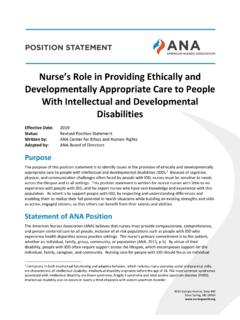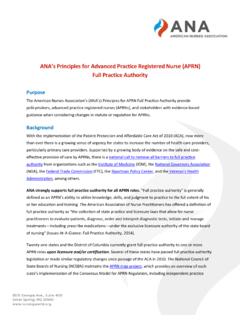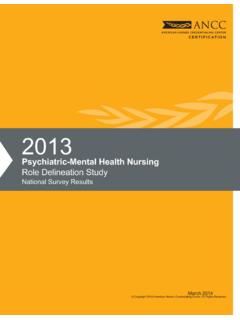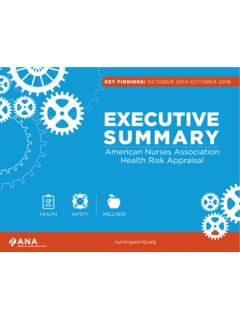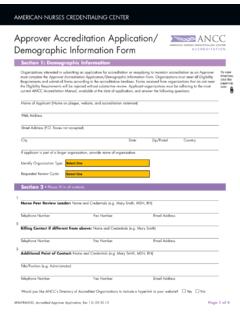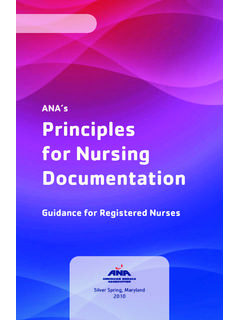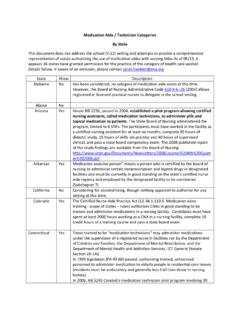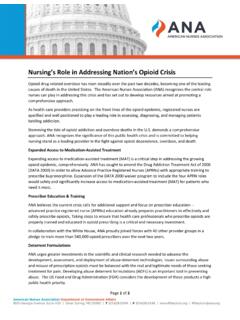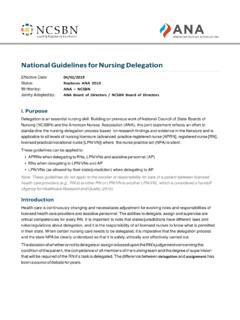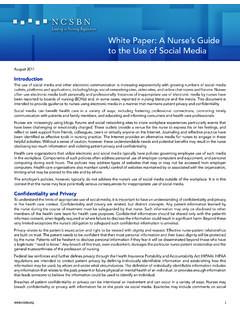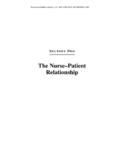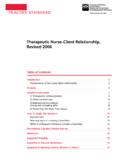Transcription of The Nurse’s Role When a Patient Requests
1 8515 Georgia Avenue, Suite 400 Silver Spring, MD 20910 The nurse s Role when a Patient Requests Medical Aid in Dying Effective Date: 2019 Status: Revised Position Statement Written by: ANA Center for Ethics and Human Rights Adopted by: ANA Board of Directors Purpose The purpose of this position statement is to provide guidance on ethical decision-making in response to a Patient s request for medical aid in dying. This statement offers assistance with understanding nurses ethical obligations in the context of this end-of-life option, which is legal in an increasing number of jurisdictions. This position statement recognizes that there are a plurality of views on the issue, that there is a paucity of available research on medical aid in dying. The goal of this position statement is not to frame a stance for or against medical aid in dying but rather to frame the nurse s compassionate response within the scope of practice, based on the Code of Ethics for Nurses with Interpretive Statements.
2 This statement is intended to reflect only the opinion of ANA as an organization regarding what it believes is an ideal and ethical response based on the Code of Ethics for Nurses with Interpretive Statements. Nothing in this statement is intended to advocate for the limitation of nurses rights and protections under applicable laws and regulations or the violation of any laws or regulations that may conflict with or appear to conflict with this statement. Statement of ANA Position The delivery of high-quality, compassionate, holistic and Patient -centered care, including end-of-life care, is central to nursing practice. Hallmarks of end-of-life care include respect for Patient self-determination, nonjudgmental support for patients end-of-life preferences and values, and prevention and alleviation of suffering. In states where medical aid in dying is legal, Patient self-determination extends to include a terminally ill Patient s autonomous, voluntary choice and informed request to self-administer medication to hasten death.
3 Medical aid in dying is not synonymous with euthanasia. There is a key distinction between the two terms. Laws that allow medical aid in dying permit an adult Patient with a terminal illness and the capacity for medical decision-making to self-administer oral or enteral medication when certain criteria are met. Euthanasia, which is not legal in the United States, occurs when someone other than the Patient administers medication in any form with the intention of hastening the Patient s death. Euthanasia is inconsistent with the core commitments of the nursing profession and profoundly violates public trust. The The nurse s Role when a Patient Requests Medical Aid in Dying 8515 Georgia Avenue, Suite 400 Silver Spring, MD 20910 Page | 2 term medical aid in dying will be used in this document. This position statement clarifies the scope of the nursing role in the care of patients who request medical aid in dying, with a particular focus on the Code of Ethics for Nurses with Interpretive Statements elucidation of nurses ethical obligations and responsibilities regarding this end-of-life option (ANA, 2015a).
4 Nurses are ethically prohibited from administering medical aid in dying medication. Yet they must be comfortable supporting patients with end-of-life conversations, assessing the context of a medical aid in dying request ( , concern about treatable depression or coercion), advocating optimized palliative and hospice care services, and knowing about aid in dying laws and how those affect practice. Nurses should reflect on personal values related to medical aid in dying and be aware of how those values inform one s ability to provide objective information in response to a Patient s request . ANA recognizes that medical aid in dying is a controversial topic that encompasses a plurality of views. Arguments for medical aid in dying are based on respect for patients self-determination, a desire to prevent unnecessary suffering, assurance that patients have access to the full range of care options at the end of life, and consideration that medical aid in dying is a last act of autonomy.
5 Arguments against medical aid in dying include the sacredness of life, the potential conflict with professional core values, and fears of a slippery slope, where the increased acceptability of medical aid in dying may impact perceptions of a life worth living (Olsen, Chan, & Lehto, 2017; Sulmasy et al., 2018). Recommendations It is the shared responsibility of professional nursing organizations to speak for nurses collectively in shaping health care and to promulgate change for the improvement of health and health care (ANA, 2015a, p. 36). Therefore, the American Nurses Association supports recommendations that nurses: Remain objective when discussing end-of-life options with patients who are exploring medical aid in dying. Have an ethical duty to be knowledgeable about this evolving issue. Be aware of their personal values regarding medical aid in dying and how these values might affect the Patient - nurse relationship .
6 Have the right to conscientiously object to being involved in the aid in dying process. Never abandon or refuse to provide comfort and safety measures to the Patient who has chosen medical aid in dying (Ersek, 2004, p. 55). Nurses who work in jurisdictions where medical aid in dying is legal have an obligation to inform their employers that they would predictively exercise a conscience-based objection so that appropriate assignments could be made. Protect the confidentiality of the Patient who chooses medical aid in dying. Remain objective and protect the confidentiality of health care professionals who are present during the aid in dying process, as well as the confidentiality of those who choose not to be present. Be involved in end-of-life policy discussions and development (Ersek, 2004) on local, state, and national levels, including advocating for palliative and hospice care services. Furthermore, research is needed to better understand the phenomenon.
7 History/Previous Position Statements The position statement titled Euthanasia, Assisted Suicide and Aid in Dying (2013) was a revised, combined position statement that originated from The Center for Ethics and Human Rights Task Force on the nurse s The nurse s Role when a Patient Requests Medical Aid in Dying 8515 Georgia Avenue, Suite 400 Silver Spring, MD 20910 Page | 3 Role in End-of-Life Decisions, Center for Ethics and Human Rights. Previously, there were two separate position statements: Assisted Suicide (12/08/94) and Active Euthanasia (12/08/94). The position statement on active euthanasia was then retired. This position statement supersedes those two previous statements. Other Nursing Organization Positions The International Council of Nurses (ICN) position statement Nurses Role in Providing Care to Dying patients and Their Families (2012) focuses on the right to die with dignity as a basic human right.
8 The ICN also recognizes the impact of cultural values on end-of-life discussions and the role of nurses in these discussions. The ICN highlights the role of the Patient in making informed choices and having the right to be free from pain. The Hospice & Palliative Nurses Association (2017) recognizes that nurses employed in states where aid in dying is legal may experience significant moral and ethical conflict. Background and Supporting Material Natural Continuum of Life Nurses recognize that death is part of the natural continuum of life and respect that end-of-life decision-making is multifactorial and deeply personal. Nursing: Scope and Standards of Practice (ANA, 2015b) informs the discussion on aid in dying, noting that nursing occurs whenever there is a need for nursing knowledge, wisdom, caring, leadership, practice, or education. The term whenever encompasses anytime, anywhere, with anyone (p. 16). Nurses provide expert care throughout life s continuum, managing the biopsychosocial and spiritual needs of patients and families both independently and in collaboration with interprofessional health care teams.
9 The Code of Ethics for Nurses Interpretive Statement underscores that in Patient care at every stage of life, including at the end of life, nurses assist others to clarify values in reaching informed decisions, always avoiding coercion, manipulation, and unintended influence. when nurses care for those whose health condition, attributes, lifestyles, or situations are stigmatized, or encounter a conflict with their own personal beliefs, nurses must render compassionate, respectful and competent care (ANA, 2015a, p. 20). Interpretive Statement of the Code supports this as well, stating that nurses establish relationships of trust and provide nursing services according to need, setting aside any bias or Such considerations must promote health and wellness, address problems, and respect patients or clients decisions (ANA, 2015a, p. 1). Participation The Code is clear in Interpretive Statement that nurses should provide interventions to relieve pain and other symptoms in the dying Patient consistent with palliative care practice standards and may not act with the sole intent to end life (ANA, 2015, p.)
10 3). A nurse s ethical response to a Patient s inquiry about medical aid in dying is not based on the intention to end life. Rather, it is a response to the Patient s quality-of-life self-assessment, whether based on loss of independence, inability to enjoy meaningful activities, loss of dignity, or unmanaged pain and suffering. Nurses understand that aid in dying legislation consistently requires that the Patient never a health care professional obtains, prepares, and self-administers the aid in dying medication. It is a strict legal and ethical prohibition that a nurse may not administer the medication that causes the Patient s death. A nurse is not actively participating in medical aid in dying when supporting dialogue, assessing the context for the request for medical aid in dying, as well as decisional capacity and Patient understanding; providing factual information in a neutral manner or responding to a Patient request to be present.
